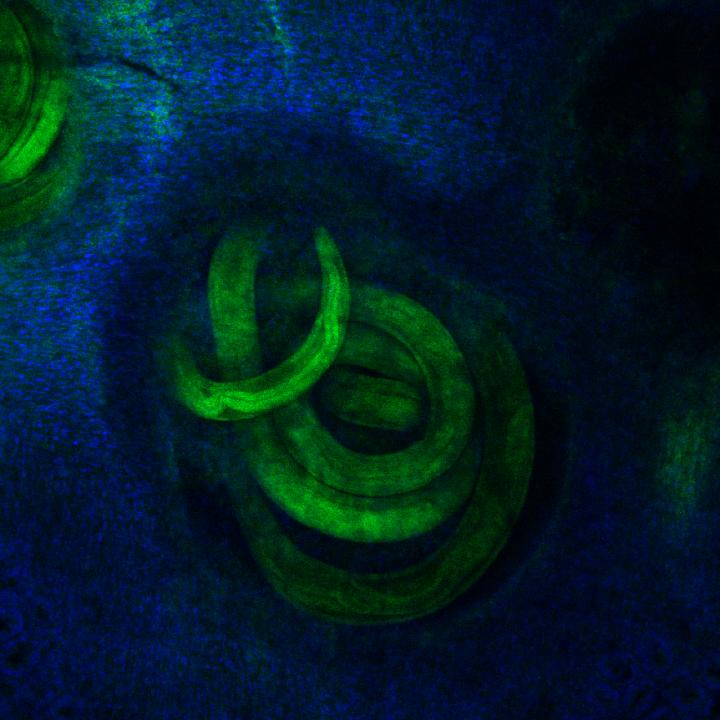A novel technique that isolates individual gut cells from mice with intestinal parasites may yield new insights on the immune response to these infections

Credit: Ferrer-Font et al. (CC BY 4.0)
A new technique may help scientists study the body’s immune response to intestinal parasite infections one gut cell at a time, according to a study published today in eLife.
Intestinal parasites are a serious threat to both humans and livestock in large parts of Africa, South America and Asia. The findings, originally posted as a preprint on bioRxiv*, may help scientists understand how adult parasites evade the immune system and to test ways to boost the immune response to fight these infections.
A parasite’s larvae may infect humans and other organisms through contaminated food or by penetrating bare skin. Once the parasites grow into adults inside the body, the immune system has a hard time getting rid of them and scientists have found it challenging to study immune cells in infected tissues.
“One big problem has been the difficulty to extract immune cells from an infected gut, as the infection causes very strong local reactions such as intense cellular slime production to try and flush the worms out,” says senior author Johannes Mayer, PhD, Research Fellow at the Malaghan Institute of Medical Research in Wellington, New Zealand.
Mayer and colleagues tested many different ways to extract immune cells from the guts of mice infected with an intestinal parasite called Heligmosomoides polygyrus bakeri. Most of their attempts failed, but they eventually developed a technique that isolated millions of immune cells from the infected animals’ guts. The technique involves three washes with EDTA, an agent to remove the mucus, lasting for 10 minutes. This is followed by 30 minutes in a solution of enzymes that help break down the tissue into individual cells, and then cell filtration.
“This allowed us to study the individual immune cells for the first time,” explains lead author Laura Ferrer-Font, PhD, Staff Scientist at the Malaghan Institute of Medical Research. “We used a new technology called spectral flow cytometry to look at many different types of immune cells all at the same time, and identified various changes that take place throughout the course of parasitic infection.”
The team also verified that the immune changes they saw in the cells were representative of the immune changes that occurred in the tissue taken from the infected animals, ensuring that the cell-extraction process did not skew their findings.
“Now that we have found a way to extract immune cells from parasite-infected guts, we can start to answer important questions about the immune response,” Mayer concludes. “This technique will enable scientists to use powerful tools like single-cell RNA sequencing to study the immune response in different hosts. It might also help those studying inflammatory bowel disorders or food allergies to extract single cells from the gut for further investigation.”
###
Reference
The paper ‘High-dimensional analysis of intestinal immune cells during helminth infection’ can be freely accessed online at https:/
*This study was originally posted on bioRxiv at https:/
Media contacts
Emily Packer, Senior Press Officer
eLife
[email protected]
01223 855373
Hamish Cameron, Science Communicator
Malaghan Institute of Medical Research
[email protected]
+64 4 499 6914 x 862
About eLife
eLife is a non-profit organisation inspired by research funders and led by scientists. Our mission is to help scientists accelerate discovery by operating a platform for research communication that encourages and recognises the most responsible behaviours in science. We publish important research in all areas of the life and biomedical sciences, including Immunology and Inflammation, which is selected and evaluated by working scientists and made freely available online without delay. eLife also invests in innovation through open-source tool development to accelerate research communication and discovery. Our work is guided by the communities we serve. eLife is supported by the Howard Hughes Medical Institute, the Max Planck Society, the Wellcome Trust and the Knut and Alice Wallenberg Foundation. Learn more at https:/
To read the latest Immunology and Inflammation research published in eLife, visit https:/
About the Malaghan Institute of Medical Research
The Malaghan Institute is New Zealand’s leading independent biomedical research institute with a focus on immunology and immunotherapy. Key areas of research and discovery include cancer immunotherapy, asthma and allergic disease, gut health, brain health and infectious diseases.
Media Contact
Emily Packer
[email protected]
Original Source
https:/
Related Journal Article
http://dx.




